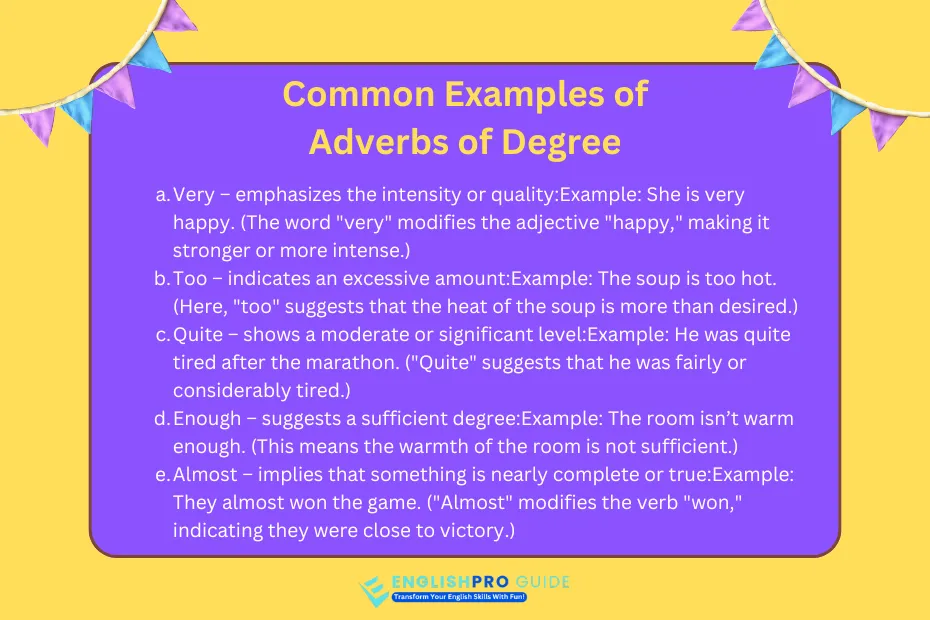Adverbs of Degree: The Subtle Art of Modifying Meaning
An adverb of degree is a type of adverb that expresses the intensity, extent, or degree of an action, an adjective, or another adverb.
These adverbs help clarify how much or to what extent something happens, modifying the meaning of the words they describe.
In everyday language, adverbs of degree answer questions like:
- “How much?”
- “To what extent?”
- “How little?”
Common Examples of Adverbs of Degree

They help provide a clearer understanding of the intensity or scale of actions and qualities in sentences. Here are some examples to illustrate how adverbs of degree function in sentences.
- Very – emphasizes the intensity or quality:
- Example: She is very happy. (The word “very” modifies the adjective “happy,” making it stronger or more intense.)
- Too – indicates an excessive amount:
- Example: The soup is too hot. (Here, “too” suggests that the heat of the soup is more than desired.)
- Quite – shows a moderate or significant level:
- Example: He was quite tired after the marathon. (“Quite” suggests that he was fairly or considerably tired.)
- Enough – suggests a sufficient degree:
- Example: The room isn’t warm enough. (This means the warmth of the room is not sufficient.)
- Almost – implies that something is nearly complete or true:
- Example: They almost won the game. (“Almost” modifies the verb “won,” indicating they were close to victory.)
How Adverbs of Degree Function in Sentences
Adverbs of degree can modify:
- Adjectives:
- Example: The book is extremely interesting. (Modifies the adjective “interesting”)
- Verbs:
- Example: He completely forgot about the meeting. (Modifies the verb “forgot”)
- Other Adverbs:
- Example: She ran quite quickly. (Modifies the adverb “quickly”)
List of Common Adverbs of Degree
- Very: He is very excited.
- Too: The coffee is too sweet.
- Extremely: It was an extremely cold day.
- Almost: She almost missed the bus.
- Enough: He is strong enough to lift the box.
- Hardly: There was hardly any time left.
- Just: I just finished the report.
Read More: Five Word Sentences for Kids: 152 Samples And Worksheet
Is it necessary to use Adverb of Degree?
No, it is not always necessary to use an adverb of degree in a sentence, but it can be very helpful in certain contexts.
The use of an adverb of degree depends on what you want to convey and how specific you want your description to be.
When adverbs of degree are useful:
Adverbs of degree are important when you want to express intensity, extent, or degree of an action, adjective, or another adverb. They add precision and help convey the strength of feelings, actions, or qualities.
- Example Without Adverb of Degree:
- “She is happy.”
- This sentence tells us she is happy, but it doesn’t explain how much or to what degree she is happy.
- Example With Adverb of Degree:
- “She is very happy.”
- This sentence is more specific, showing that her happiness is intense.
When You Don’t Need Adverbs of Degree:
In some situations, the sentence might already be clear or strong enough without needing additional emphasis. If the meaning is obvious or you don’t want to add intensity, an adverb of degree may be unnecessary.
- Example:
- “The car stopped.”
- Adding an adverb of degree like “almost” or “completely” might change the meaning, but if you don’t need to clarify how much the car stopped, you can leave the sentence simple.
Why You Might Avoid Overuse of Adverbs of Degree
Overusing adverbs of degree can sometimes make your writing less effective. Too many qualifiers can make sentences feel cluttered or vague.
Example:
- “She is very extremely excited.”
- This sounds awkward and repetitive. Using just one adverb of degree (e.g., “extremely”) would be better.
Conclusion
Adverbs of degree are essential in making language more specific and expressive.
They help convey the extent of actions, qualities, or other descriptions, ensuring that the message is more precise and impactful.
Answering the question “to what extent?”, these adverbs add clarity and depth to communication.






